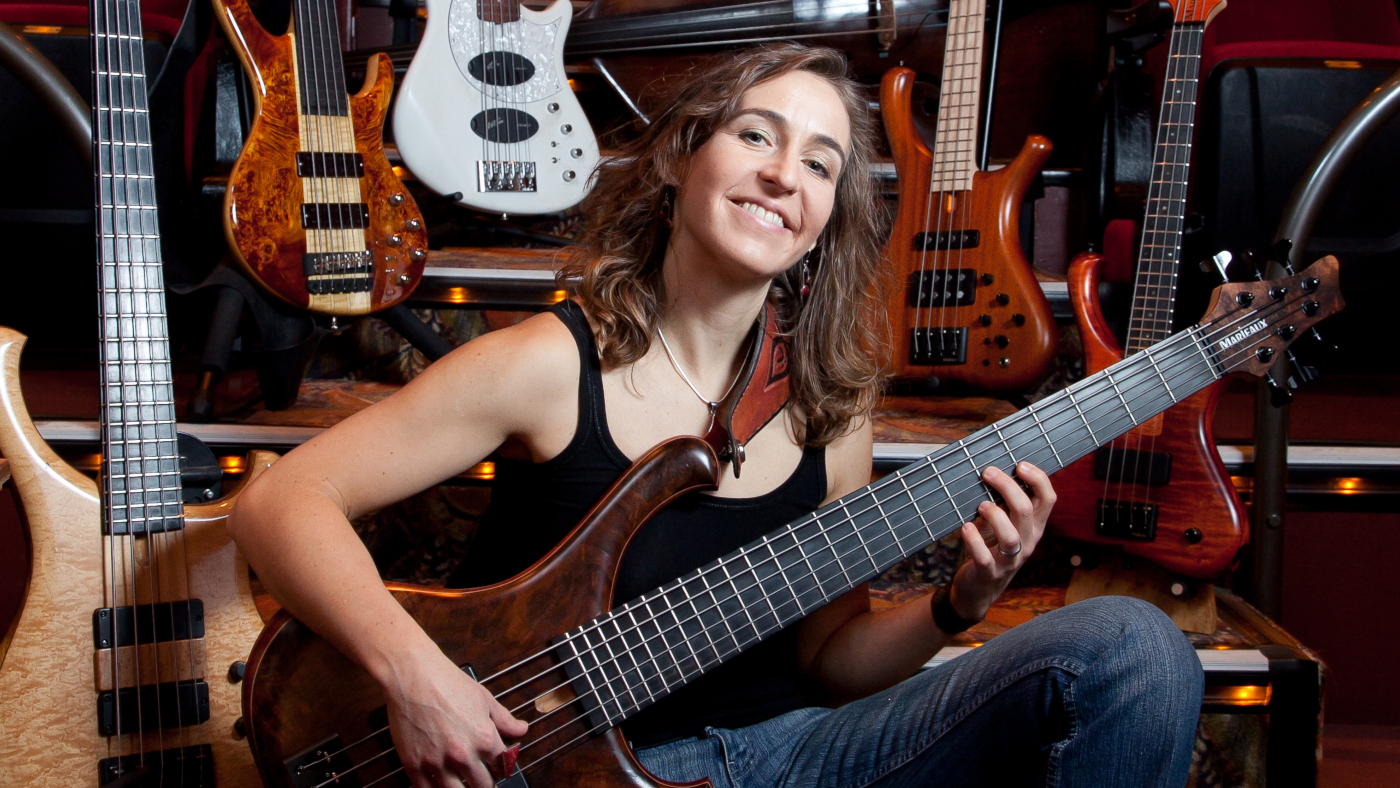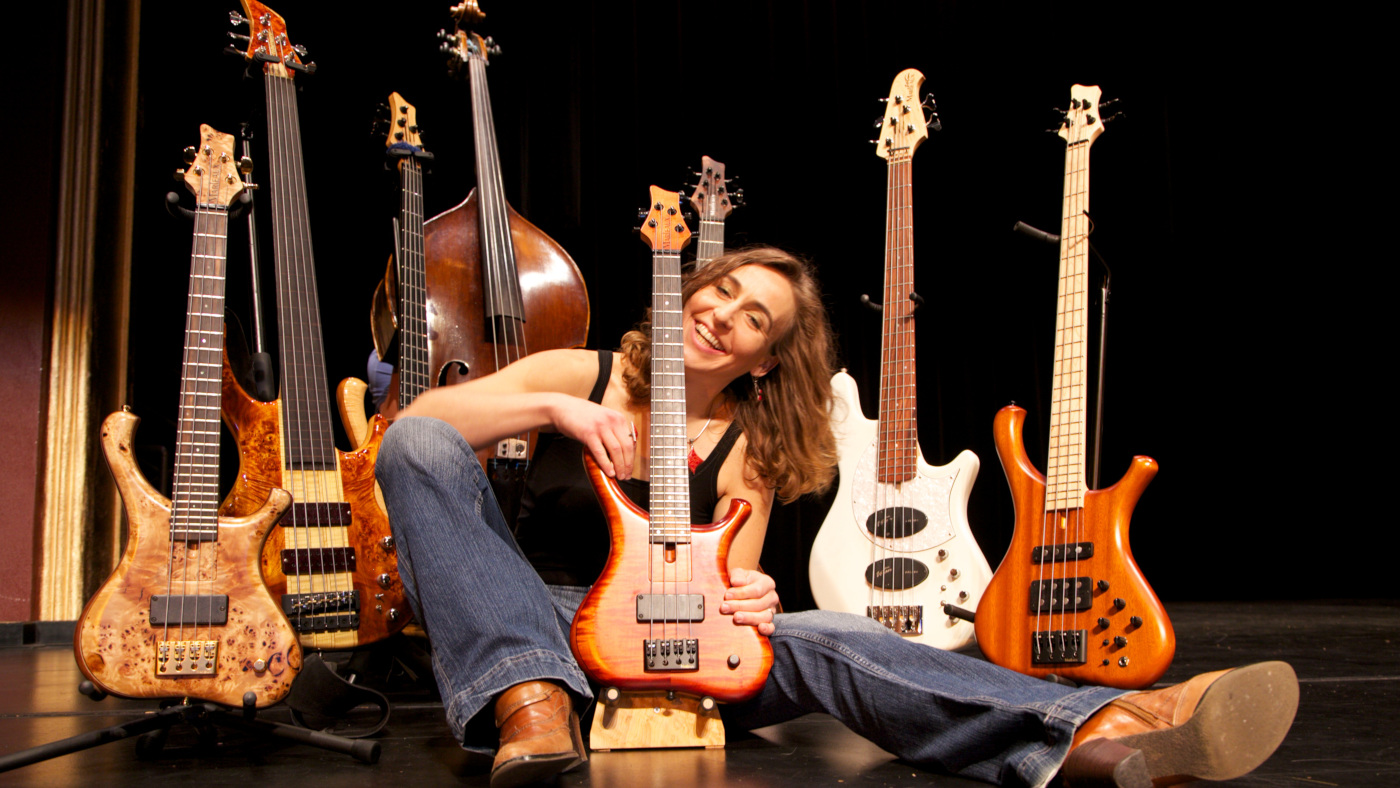Ariane Cap: “I want to be the best musician I can be, and I also want to be the best educator I can be”
The bassist on juggling her routine, projects and rapid-fire learning

Want all the hottest music and gear news, reviews, deals, features and more, direct to your inbox? Sign up here.
You are now subscribed
Your newsletter sign-up was successful
Austrian-born, California-resident composer, educator, blogger and bassist extraordinaire Ariane Cap has a serious mission - to teach bassists to learn better.
Listen up: what she says might just change your life - and you can see her in person at the London Bass Guitar Show in September 2019.
You’re originally from Innsbruck, correct?
“I am, yes. I studied biology there, but when I got my degree, I was beginning to get interested in music, so I went to the bass school in Munich - Bass BMI. I’ve been in the USA since late 1998, when I got a scholarship for the University of Miami for a year. After that I was like, ‘I’m not leaving. I’m enjoying this too much’. I usually tell people I live in ‘Los Francisco’ because I commute between San Francisco and Los Angeles all the time.”
You’re an educator, a performer, a recording artist and a composer. What’s a typical day for you, if there is such a thing?
I think I play way better if I’m feeling good, and I hear better as well
“I have this ideal day scheduled, that I dangle in front of myself every single evening before I go to sleep, but it doesn’t always work out exactly that way! So I wake up and I do my workout. Working on my health is very important to me, just because if I don’t do it, I don’t feel right. It’s usually weightlifting or interval training, and I meditate. I used to do yoga too, but I injured myself, so I’m careful with that.
“I think I play way better if I’m feeling good, and I hear better as well. If I don’t sleep right, my ears are off. Then I have a practice session, where I do a round of bass technique and a round of my pattern system. After that I look at emails and business stuff. If it’s a teaching day, then I have my morning teaching load, and then in the afternoons I create.”
Want all the hottest music and gear news, reviews, deals, features and more, direct to your inbox? Sign up here.
Do you teach remotely?
“Yes, I use Zoom. What’s happening there makes me so excited. It’s hard for me to do just one thing, because I love both teaching and playing. People tell me that I’m a born teacher: my dad was a university professor. I love figuring out how to help people get something going. After the teaching, I’m a little tired, so it’s easier for me to get into the zone and write. And the evening is either a gig or a recording or some sort of creative bass thing, or just more practising.”
That’s a pretty busy day.
“I wouldn’t want to have it any other way. I blog every week, and I’m also on Quora and I answer questions there all the time. I try not to look at any screens before going to bed, but of course last night I was editing video until 2am. I do these activities for 14, 15, 16 hours every day, and I love it.”
Meshing
Tell us about your musical projects.
“There are several projects in the Bay Area that I play with. One is Generation Esmeralda. It’s a disco outfit. They used to be huge in the 70s. It’s a 10-piece band with a killer horn section and it’s just super-fun. We went to Brazil together a couple of years ago and we’re hoping to do another South America stint soon.”
Tell us about OoN, your bassoon and bass duo with Paul Hanson.
All of my basses are Marleaux except for a really nice Ken Smith six-string, a Fibenare and a Kala UBass
“It was interesting how that came about. A good friend of ours brought us together. He’s a fantastic bass player called Derek Jones, and he plays with Cirque du Soleil. Derek said, ‘You guys need to talk’, and so we got together. I’m a huge fan of Michael Manring and Steve Lawson and all these solo bass cats, and I’ve been dabbling with solo bass for a long time. Paul is an amazing musician. He played with the Flecktones, and he’s out on tour with Billy Cobham right now. He also uses harmonisers and plays the bassoon in a very non-traditional way. When you hear the bassoon played through a harmoniser, it hits you in the gut. It’s like a big band.”
How do the two instruments mesh?
“I come up with a bass-line while Paul is high up, so I need to be chording. I really love laying it down when he’s wailing over the bass. I just want to keep it groovy. That is such a great challenge, because we’re both bass instruments, if you will. Hence the name - bassoon minus bass equals OoN.”
Tell us about your bass gear.
“All of the basses are Marleaux except for a really nice Ken Smith six-string, a Fibenare and a Kala UBass. I love those. I have electric and acoustic versions. In my bands I play five-string basses. You only need a six-string for tapping. I like four-strings for teaching, because it’s easier for students. I use TC Electronic amps - I love their stuff - and I recently discovered RevSound cabs. They are super-light and sound killer, and they work great with the TCs.”
What are your objectives?
“I want to be the best musician I can be, and I also want to be the best educator I can be. Whenever I practise for myself, I always examine how could I help somebody integrate what I’m doing. I myself have had fantastic teachers. As a matter of fact my first bass teacher was Wolfgang Wein, and I ended up marrying him. He’s an amazing bass player.”

Getting better
Who’s better, you or him?
“Oh God, don’t ask me that! I still go to him with questions every day. He’s just an incredible musician. He knows so much about theory, and he’s a composer. I’m a bass player, so I think bass, bass, bass, but he thinks way bigger than that. I’ve learned so much from him about the emotional context of music and how you can put the bass not just as the bottom but elsewhere too.”
Where does your songwriting inspiration come from?
Five minutes of PORA is like 20 hours of regular practice where you mindlessly move your fingers
“Often it just comes from hanging out on the bass and coming up with parts. New pedal settings can be inspiring too. Paul totally turned me on to several wicked ways of using the delay pedal, like hocket delays and where the slapback comes back at you in certain spots. You can use them as part of the groove, not just as a trail of notes. I experiment, trying stuff, and things emerge or they don’t. Wolf and I are also experimenting with layering bass. There’s one track on the OoN album called ‘Pebble Stone Meditation’ where we just layer bass. It has this eerie ethereal sound, with polyrhythmic delays on top of each other.”
Tell us about your Principles Of Rotating Attention (PORA) education system.
“I developed PORA inspired by what classical musicians teach us. It’s a method where you practice focusing your attention on a very specific issue each time you practise. It could be two measures, or a little permutation exercise, or just a fingering thing. Let’s say an issue would be that your fingers are sticking out from the fretboard: you say, ‘I’m going to play this part with my fingers down. That’s all I’m focusing on’.
“If your mind starts wandering, you just bring it back. So you do one round of that, with all the fingers down, and on the second round you would listen to - for example - the click, to make sure you perfect your timing and really play on the click. This time, I don’t mind if your fingers are sticking out, but the click’s got to be on it. And so you rotate your attention through two or three or four items, and you pause, and then you evaluate. Over time it gets easier. It’s a great way to change habits.”
That’s so cool.
“Yeah, it’s been very successful. People get addicted to it. They start seeing what five minutes of PORA, which is probably the longest you should do it in the beginning, can achieve. Five minutes of PORA is like 20 hours of regular practice where you mindlessly move your fingers.”
Five pillars
There are plenty of theories behind learning. For you, what is successful bass education based on?
“I suggest that it is based on five pillars. One is visual, when you’re visualising the fretboard, or actually seeing the fretboard. One is kinaesthetic, like when you play a shape on the fretboard. The third is auditory, which is an obvious one - we hear it, it’s music. Then there is a conceptual one, like theory. For example, I know that a line is a II-V-I or whatever, or I can learn a solo and start it on the third because I know what that is going to sound like. Finally there is the ‘I don’t know where it comes from’ one. The purely creative zone, when it’s just flowing and you think ‘Did I just play that?’”
How does this translate into everyday bass playing?
At the moment I’m writing four bass books at once. They’re all on building ‘Music Theory For The Bass Player’
“Well, for every one of these channels, you can be very specific. You can say, ‘Okay, today I want to play this scale and this shape, up and down, mechanically’. That’s the kinesthetic channel, which is also the fastest channel. You can’t think about a thing as fast as you can play it. So whenever somebody is unsure of how to learn something, you can bring it down to one of these channels. ‘Okay, you’re going to visualise a G major scale on the fretboard. Can you see it? What’s your third finger doing on the G string?’ I find that that is very applicable and practical, and it’s something you can use when people are nervous. I use these suggestions to pop them back into the moment, so they can relax and play.”
What lies ahead for you?
“At the moment I’m writing four bass books at once. They’re all building on "Music Theory For The Bass Player". The next one coming up is a pattern book - it's a method that uses fundamental musical materials like scales, chords, intervals to train the musical mind while at the same time learning the entire fretboard in a really deep and systematic way. We are working on two new courses that will be released within a month and a mini book on the PORA method. With OoN we're working on new songs and are getting close to recording our second album.”
What a huge vindication for you.
“Yeah, it’s been incredible. It was interesting because my first book was extremely successful. I would have never predicted that, because it’s music theory, which is a niche - and for the bass player, even more of a niche!”

